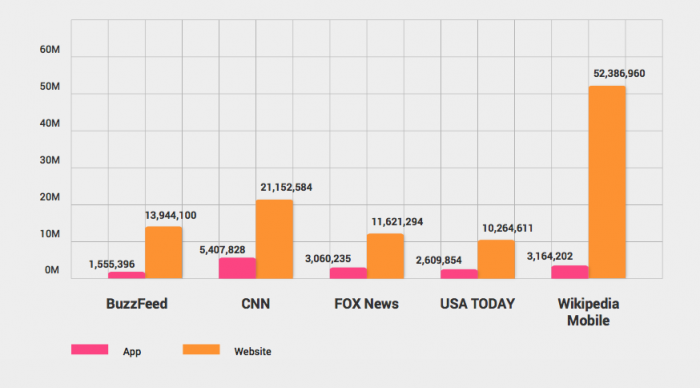
A new report released Wednesday by the Knight Foundation and commissioned from measurement firm Nielsen explores all the nooks and crannies of how people in the U.S. access news on their smartphones (disclosure: Knight also supports Nieman Lab).
A portion of the findings from this Knight-Nielsen report are based on data from 9,000 iPhone and Android users who opted in to an “always-on” tracking meter on their phones, so that their phone usage could be continuously monitored for a two-year period (no risk here of people exaggerating/lying!). Nielsen also conducted a survey of 2,176 users looking at their news consumption behaviors on social media.Some findings on usage:
— These monitored mobile users spend about five percent (more than two hours) of their mobile time each month on news. The time they spent within news apps and on news sites directly seems to have decreased over the past year.
— In contrast, 27 percent (more than 12 hours) of mobile time each month is spent on social networking sites. Additional survey data found that 70 percent of Facebook users use the platform for news every day.
— Reddit users are power users: They go to the app frequently and spend five times as much time within the Reddit app as other top news apps.
— Not surprisingly, the report found that the mobile news readers who use dedicated news apps spend a substantial amount of time within the apps. Those apps have much smaller audiences compared to mobile websites:


The report also looked at demographics of these mobile news readers:
— Overall, it found smartphone users between the ages of 18 and 24 and those who are more well-off (with household incomes greater than $75,000) are more likely to seek news within social media apps.
— Users referred from social sites and chat apps (Snapchat, Facebook Messenger, Google Hangouts, Instagram, and Pinterest) are younger and more ethnically diverse.
— BuzzFeed, Facebook, Reddit, and CNN are more likely to refer ethnically diverse audiences to other mobile news content.
You can read more of the report here.
3 comments:
Perfect piece of work you have done, this site is really cool with excellent information.
I like this web site very much, Its a really nice position to read and get information.Raise range
Howdy! This post couldn’t be written any better! Reading through this post reminds me of my previous room mate! He always kept talking about this. I will forward this article to him. Pretty sure he will have a good read. Thanks for sharing!
Trackbacks:
Leave a comment